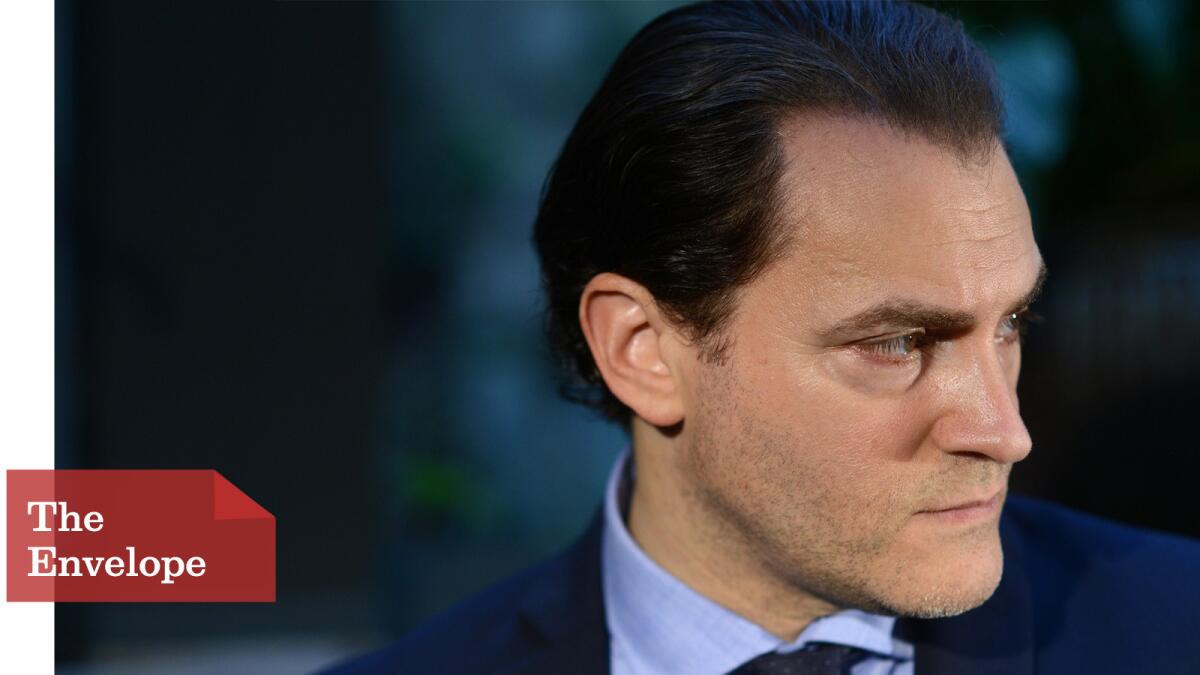Q&A: Michael Stuhlbarg might be the most popular actor you don’t recognize

Michael Stuhlbarg, who has roles in “Steve Jobs,” “Trumbo” and “Pawn Sacrifice,” says, “If you look closely and listen well, you’ll be surprised by what you pick up.”
Reporting from NEW YORK CITY — Michael Stuhlbarg. If his face is unfamiliar, credit his chameleonic ability to disappear into roles; if his name doesn’t ring a bell, just wait a few months. He’s got roles in no fewer than three awards-season films (“Steve Jobs,” “Trumbo” and “Pawn Sacrifice”), and the actor (who starred in 2009’s “A Serious Man” and HBO’s “Boardwalk Empire”) is soon to be seemingly everywhere. The Envelope talked to the Long Beach native about noise, working with Marcel Marceau and how he’s learned to “think different.”
You’ve worked as an actor for decades, but for many you’ve passed under the radar. Is that a good thing?
I came to New York to study theater and stayed and was doing exactly what I wanted to do. It’s because of that work that some doors eventually opened for me. Had I pursued a film career in Los Angeles, I’m not sure I would have had the fortune that I’ve had.
SIGN UP for the free Indie Focus movies newsletter >>
You certainly studied in a lot of schools in L.A., New York, London, Lithuania. Then also with Marcel Marceau. What was that like?
I won a scholarship at UCLA to study with him for a summer at the World Center for Mime at the University of Michigan. I admire the severe discipline it takes to utilize every muscle in your body to tell stories. I didn’t really have an interest in being a mime at all. [Marcel] was very gregarious. He had a lot to say and was a passionate, loving man.
In “Trumbo,” you play Edward G. Robinson. How do you inhabit that role without echoing the familiar gangster actor caricature?
My heart was wide open to the guy, and I had a huge respect for his body of work. I watched interviews on YouTube and you got a sense of what a sweet man he was, what a proud man he was. He was 7 when he came over from Romania, and he really loved the idea of being an American. He kept a sense of right and wrong.
There isn’t much physical resemblance between you two, yet you only had a prosthetic nose to transform into character. How did that work?
I find if you can look in the mirror and see something other than the face you see every day, it can free you up in terms of who you play. Wearing a mask can free you up. I also put some weight on and I had to think different, so to speak.
Speaking of which, you’re playing Andrew Hertzfeld, who helped invent the Macintosh, in “Steve Jobs.” Did you get to meet him?
Production went out of their way to invite Andy to come speak with me; he invited me out to Palo Alto and we spent a lovely day together. We walked around his neighborhood and he’d point out the garage where Hewlett-Packard was founded, and Steve’s house a few blocks away. He’s a very straightforward, openhearted guy.
In the film, he comes across as one of the consciences that Jobs doesn’t want to listen to.
Yeah, he’s got a very strong moral center. He’s the first one who would say sometimes it’s good to keep your mouth shut, but if he sees something wrong, he’ll speak. Andy was one of those people who would tell you what he thought and let the consequences go where they may.
Do you have to make a conscious decision to be more “open” when absorbing a character?
It’s the difference between listening and hearing. If you look closely and listen well, you’ll be surprised by the things you pick up.
Have you become a better listener since becoming an actor?
The more I’ve done this, the more I’ve learned how important it is to listen well. There’s a lot of noise in the world. And one of the beautiful things about doing theater and film is the absence of that noise, or perhaps the adding of that noise where it’s helpful in telling the story. I’m always trying to get rid of that noise. The more you do it, the better you get.
ALSO:
Tom Hardy’s characters frighten him too -- but he can’t stay away
The true stories behind the making of six Oscar-contending documentaries
December’s Oscar hopefuls have to catch up with ‘The Martian,’ ‘Room,’ ‘Mad Max’ and more
More to Read
From the Oscars to the Emmys.
Get the Envelope newsletter for exclusive awards season coverage, behind-the-scenes stories from the Envelope podcast and columnist Glenn Whipp’s must-read analysis.
You may occasionally receive promotional content from the Los Angeles Times.







